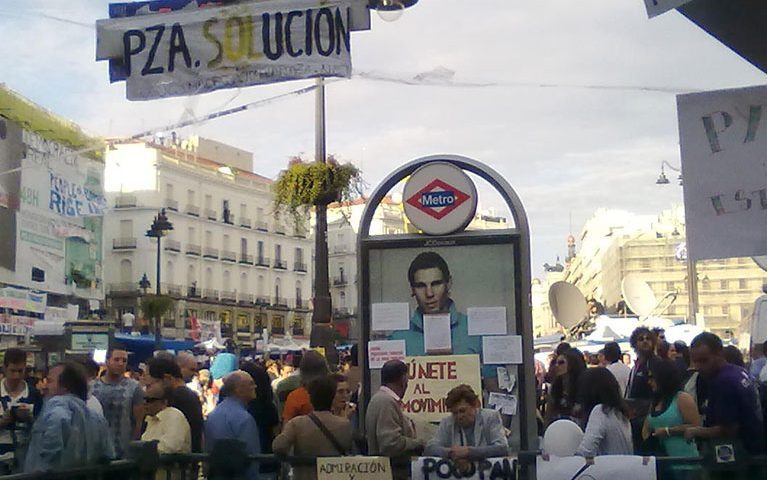Does E-Participation Influence and Improve Political Decision Making Processes? Evidence From a Local Government

Arte y Ciencia: la emoción de lo misterioso
16 marzo, 2017
Amancio Prada, la palabra encantada
30 marzo, 2017Una preocupación cardinal de mi carrera, a menudo desatendida por obligaciones académicas y profesionales diversas, es el estudio de las condiciones que favorecen los procesos democráticos. Hace cosa de tres años pude retomar de nuevo esta preocupación tan cara, gracias al feliz encuentro con Ángel Iglesias.
Desde entonces mantenemos una fructífera colaboración, orientada hacia el ámbito local, pero en perspectiva comparada y con preocupaciones globales. Ofrezco a continuación el resumen, las conclusiones y referencias bibliográficas de un reciente texto, así como el enlace a la revista en que se publica.
Does E-Participation Influence and Improve Political Decision Making Processes? Evidence From a Local Government
Ángel Iglesias Alonso y Roberto-Luciano Barbeito
University Rey Juan Carlos (Madrid)
Abstract
In Local Governments, the quality of representative democracy is also measured by the extent to which demands of citizens and groups influence the agendas of local politicians. In this context, the potential of Internet and the NIT as tools that encourage participation, exchange and deliberation, have not been fully explored by either the local elites or the citizens to foster the discursive and decision-making dimensions of local democracy. But despite the growing importance of e-participation in improving local democracy, it remains unclear to what extent it also contributes to the introduction of new repertoires of action to improve efficiency and quality of local public service provision and, therefore, involving citizens meaningfully in the decision-making process continues to be a challenge. With this in mind and using recent empirical evidence from the current development of e-participation to improve administrative performance in a large city government, intended to enhance not only local democracy but also better decision-making, the paper focus on this gap on research by exploring to what extent e-participation contributes to foster, influence and improve local decision-making.
Key words: Local Democratic Renewal, Citizen’s participation, On-line democracy, Spain, Madrid
- Conclusions
The experience of Decide Madrid reveals that unsuspected contextual factors, such as protesting social movements, on a local basis although organized around global digital networks, may represent a decisive inspiration, and an amazing lab, for the development of new direct e-democracy tools in already existing political institutions. The study case allows us to understand that technical obstacles are always possible to overcome, no matter how complex they may seem, when there is political will.
The provisional results of the study case are consistent, furthermore, with the major hypothesis inspiring this research: that new technologies influence and may favour or worsen political decision-making processes. For now, Decide Madrid seems to be more successful as an instrument to make citizen decisions than a tool to increase citizen participation, which is quite low despite all the facilities provided by the virtual platform. Indeed, both supporters and detractors of such tools rely more on previous ideological positions rather than on results effectively obtained. For that reason, a future course of study should deeply identify what other non-technological variables affect direct political participation in most of the population. It should be studied, e.g. the role economic circumstances perform, lifestyle, available time and both cognitive and cultural resources. At any rate, this case study allows us to conclude that political will and the display of proper technological tools are essential preconditions for effective participation, although not enough.
Although e-democracy tools designed by Ahora Madrid are audacious, they have not yet entailed truly innovative democratic practices or institutions, except for the use of digital technology. Perhaps the theoretical references the developers move around (IT and communication experts, rather than experts on democratic theory and analysis) are anchored in quite basic conceptions of direct democracy (citizen requests, referendums, election among choices) aimed at the general public.
It is precise to inform the importance of experiences like Decide Madrid reaching higher levels of popular participation and promote truly innovative ways of political decision. Otherwise, its critics would argue, in order to discredit it, that direct and deliberative democracy does not work; and its promoters would end up frustrated in contrast to their high expectations. The corollary could constitute a major setback for direct and deliberative democracy, making e-democracy gradually dwindle and become an online voting device. Consequently, the challenge for any e-democracy project must be consolidating ways of direct and deliberative democratic participation that involve, in an effective and sustained over time way, all of the population. This forces us, as suggested by Laval & Dardot (2015) to imagine truly innovative institutions for the exercise of the democratic process, as well as to rethink the currently available institutions for exercising democracy, and also to think of the importance of imbricating in the same effort the non-political institutions that, however, affect political equality (basically economic, cultural and communication institutions)
Robert Dahl (1989) suggested that local level policy areas constitute an ideal ground to experiment these new forms of e-democracy, halfway between representation and direct participation. Needless to say, travelling that road will not be easy. As if this were not difficult enough, the study case here analyzed suggests that municipalities must anticipate the unforeseen consequences implementing e-democracy, and must prepare to face them. However, there is very reason to think that the development of other similar e-democracy experiences, as well as their contrast through comparative research, will allow to strengthen the preliminary conclusions operated here and also, in the end, take the path to a more inclusive and horizontal local democracy.
- References
Alcazán, A. et al. (2012) Tecnopolítica, Internet y R-evoluciones: Sobre la Centralidad de las Redes Digitales en el 15-M (Barcelona: Icaria).
Álvarez, K. et al. (2011) Nosotros, los Indignados. Las Voces Comprometidas Del #15-M. (Barcelona: Destino).
Antentas, J.M. & Vivas, E. (2012) Planeta Indignado. Ocupando el Futuro (Madrid: Sequitur).
Antentas, J.M. & Vivas, E. (2009) Resistencias Globales. De Seattle a la Crisis de Wall Street (Madrid: Icaria).
Borja, J. (2013) Revolución Urbana y Derechos Ciudadanos (Madrid: Alianza).
Calle, Á. (2012) Nuevos Movimientos Globales. Hacia la Radicalidad Democrática (Madrid: Popular).
Castells, M. (2012) Redes de Indignación y Esperanza. Los Movimientos Sociales en la Era de Internet (Madrid: Alianza).
Castells, M. (2009) Comunicación y Poder (Madrid: Alianza).
Champeau, S. & Inneraty, D. (2010) Internet y el Futuro de la Democracia (Barcelona: Paidós).
Cruells, M. & Ibarra, P. (2015) La Democracia del Futuro. Del 15M a la Emergencia de una Sociedad Civil Viva (Barcelona: Icaria).
Dahl, R.A. (1989) Democracy and Its Critics (New Haven: Yale University Press).
Dahlgreen P. (2009) Media and Political Engagement (New York: Cambridge University Press).
Dutton, W. (1999) Society on the Line: Information Politics in the Digital Age (Oxford: Oxford University Press).
Feixa, C. & Nofre, J. (2013) #Generaciónindignada: Topías y Utopías del 15-M (Lleida: Milenio).
Goldsmith, J. & Wu, T. (2006) How Controls the Internet? Illusions of a Borderless World (New York: Oxford University Press).
Harvey, D. (2011) Rebel Cities: From the Right to the City to the Urban Revolution (London: Verso).
Hadzelek, A. & Rodríguez Prieto, R. (2014) ‘Movinets and the Future of Social Movements: How 15M and Occupy Revolutionised Political Protest’, In Gleeson, K. et al. Essays 2014: Politics (Melbourne: Australian Scholarly Publishing), pp. 33-49.
Iglesias, Á. & Barbeito, R.L. (2014) Es Posible Más y Mejor Democracia? Democracia como Empoderamiento Político del Ciudadano, In: Barataria. Revista Castellano-Manchega de Ciencias Sociales, 18, pp. 215-242.
Jordan, T. (1999) Cyberpower: The Culture and Politics of Cyberspace and the Internet (London: Routledge).
Juventud Sin Futuro (2011) Sin Casa, Sin Curro, Sin Pensión, Sin Miedo (Madrid: Icaria).
Kies, R. (2010) Promises and Limits of Web-Deliberation (New York: Palgrave Macmillan).
Korac-Kakabadse, N., Kouzmin, A. & Korac-Kakabadse. A. (2000) Current Trends in Internet Use: E-Communication, E-Information and E-Commerce, Knowledge and Process Management: The Journal of Corporate Transformation 7(2), pp. 133-42
Laval, Ch. & Dardot, P. (2015) La Nueva Razón del Mundo (Barcelona: Gedisa)
Martínez, F. & Rodríguez, R. (2016) Poder e Internet. Un Análisis Crítico de la Red (Madrid: Cátedra).
Mason, P. (2013) Why It’s Still Kicking Off Everywhere: The New Global Revolutions (London: Verso).
Milward, H.B. & Snyder, L.O. (1996) Electronic Government: Linking Citizens to Public Organizations Through Technology, In: Journal of Public Administration Research and Theory, 6 (2), pp. 261-275.
Morán, M.L. (2012). Actores y Demandas en España. Análisis de un inicio de Siglo Convulso (Madrid: Catarata).
Morozov, E. (2012): El Desengaño de Internet: Los Mitos de la Libertad en la Red, (Barcelona: Destino).
Navarro, V. (2015) Ataque a la Democracia y al Bienestar. Crítica al Pensamiento Económico Dominante (Barcelona: Anagrama).
Navarro, V. & Muntaner, C. (2014) The Financial and Economic Crisis and Their Impact on Health and Social Well-being (New York: Baywood)
Norris, P. (2001) Digital Divided: Civic Engagement, Information Poverty and the Internet In Democratic Societies (Cambridge: Cambridge University Press).
Ortiz, I. et al. (2013) World Protest 2006-2013 (New York: Initiative For Policy Dialogue, Columbia University & Friedrich-Ebert-Stiftung. Avaliable at: http://policydialogue.org/publications/working_papers/world_protests_2006-2013/> Date accessed: 06 Oct. 2014.
Ragin, Ch.C. & Becker, H.S. (1997) What is a Case? Exploring the Foundations of Social Inquiry (Cambridge: Cambridge University Press).
Subirats, J. (2015) Todo se Mueve. Acción Colectiva, Acción Conectiva, In: Revista Española de Sociología, 24, pp.123-121
Taibo, C. (2011b) El 15-M en Sesenta Preguntas (Madrid: Catarata).
Taibo, C. (2011a). La Rebelión de los Indignados: 15-M. Democracia Real, ¡Ya!. (Madrid: Popular).
Tascón, M. & Quintana, Y. (2012) Ciberactivismo. Las Nuevas Revoluciones de las Multitudes Conectadas (Madrid. Catarata).
Tilly, Ch. & Wood, L.J (2010) Los Movimientos Sociales, 1768-2008 (Barcelona: Crítica).
Torres, J. et al. (2011) Hablan Los Indignados. Propuestas y Materiales de Trabajo (Madrid: Popular).
Tsagarousianou, R. et al (1998) Cyberdemocracy. Technology, Cities and Civic Networks (London: Routledge).
Velasco, P. (2011) No Nos Representan. El Manifiesto de los Indignados en 25 Propuestas (Barcelona: Temas De Hoy).
VVAA (2011) ¡Indignados! 15M (Madrid: Mandala).



